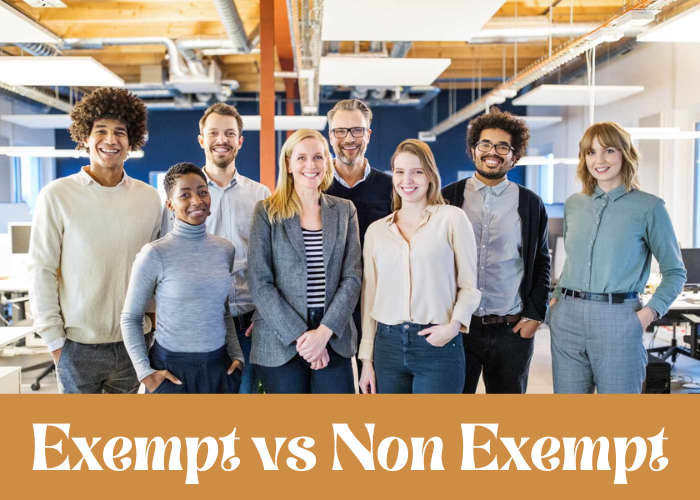What is the difference between exempt vs non exempt employees? Exempt employees are not subject to the same overtime rules as non exempt employees. This means that they are not entitled to overtime pay for hours worked over 40 in a week. Non-exempt employees, on the other hand, must be paid overtime for all hours worked over 40 in a week. So, what determines whether an employee is exempt or non exempt? Read on to find out!
What Is the Difference Between Exempt and Non Exempt Employees
The main difference between exempt and non exempt employees is that exempt employees are not entitled to overtime pay, while non exempt employees are. Exempt employees are typically paid a salary, rather than an hourly wage, and their job duties must meet certain criteria to qualify for the exemption. Non exempt employees, on the other hand, must be paid at least minimum wage and are entitled to overtime pay if they work more than 40 hours in a week.
Exempt employees are typically executive, administrative, or professional workers, though there are a few other categories of exempt workers as well. To qualify as exempt, an employee’s job duties must meet certain tests regarding their primary duty and level of responsibility. Exempt employees must also be paid a salary of at least $455 per week ($23,660 per year).
Non exempt employees include hourly workers as well as some salaried workers who do not meet the criteria for exemption. Non exempt employees must be paid at least minimum wage and are entitled to overtime pay if they work more than 40 hours in a week. In some cases, salaried non exempt workers may be entitled to overtime pay if their salary is less than a certain amount and their job duties do not meet the criteria for exemption.
How Do You Know if You Are an Exempt Employee
Employees can be classified as exempt or non-exempt. The major difference between the two is that exempt employees are not entitled to overtime pay, while non-exempt employees are. Exempt employees are also typically exempt from other wage and hour laws, such as minimum wage and break periods. So how do you know if you are an exempt employee? Generally, exempt employees are executive, administrative, or professional workers. To qualify as an exempt executive employee, you must typically have authority to hire and fire other workers, or at least a significant say in the hiring and firing process. To qualify as an exempt administrative employee, you must typically perform work that is directly related to the management or general business operations of the company. To qualify as an exempt professional employee, you must typically have advanced knowledge in a particular field, such as medicine or law. If you are not sure whether you qualify as an exempt employee, you should check with your employer or with the U.S. Department of Labor.
What Are Some of the Benefits of Being an Exempt Employee
Exempt vs non exempt, what are the benefits of being an exempt employee? Exemption from overtime pay is the primary benefit of being an exempt employee. Exempt employees are also typically paid a salary rather than an hourly wage. This means that they receive the same amount of pay each week regardless of how many hours they work. Exempt employees may also be eligible for certain fringe benefits, such as health insurance and retirement plans. In addition, exempt employees typically have more job security than non-exempt employees. This is because they can only be terminated for cause, such as misconduct or poor performance. As a result, exempt employees often have greater job satisfaction and loyalty to their employer.
How Do You Become a Non Exempt Employee
Exempt vs non exempt employees refers to the Fair Labor Standards Act (FLSA) classification of employees. Exempt employees are not entitled to overtime pay, while non-exempt employees are. Exempt status is generally based on an employee’s job duties, rather than their job title. To be classified as exempt, an employee must typically meet all of the following criteria:
- They must be paid on a salary basis (rather than hourly)
- They must be paid a minimum salary threshold
- They must perform certain job duties (usually executive, administrative, or professional)
Exemption status is not determined by an employee’s job title – even if an employee has the word “manager” in their title, they may still be classified as non-exempt if they do not meet the criteria listed above. Exemption status can also change – for example, if an employee is demoted from a managerial position to a regular staff position, they would then become entitled to overtime pay. If you’re unsure about your exemption status, you should speak to your employer or HR department. Exemption status can have a significant impact on your pay and working hours, so it’s important to make sure you’re classified correctly.
What Are Some of the Benefits of Being a Non Exempt Employee
Exempt vs non exempt, what does it all mean? Exempt employees are not entitled to overtime pay, whereas non-exempt employees are. Exempt employees are typically salaried, while non-exempt employees are typically hourly. Exempt employees tend to have more responsibilities and work more independently than non-exempt employees. Non-exempt employees may be entitled to benefits such as vacation days and health insurance. Exempt employees may be able to negotiate for better salaries and more responsibility. Ultimately, the decision of whether to be exempt or non-exempt is a personal one dependent on individual circumstances.
Conclusion
Understanding the difference between exempt and non-exempt employees is crucial for any business. By understanding the law and classifying your employees correctly, you can avoid costly mistakes that could land your business in hot water. If you’re ever unsure of how to classify an employee, be sure to consult with an attorney or HR professional to get clarification.
